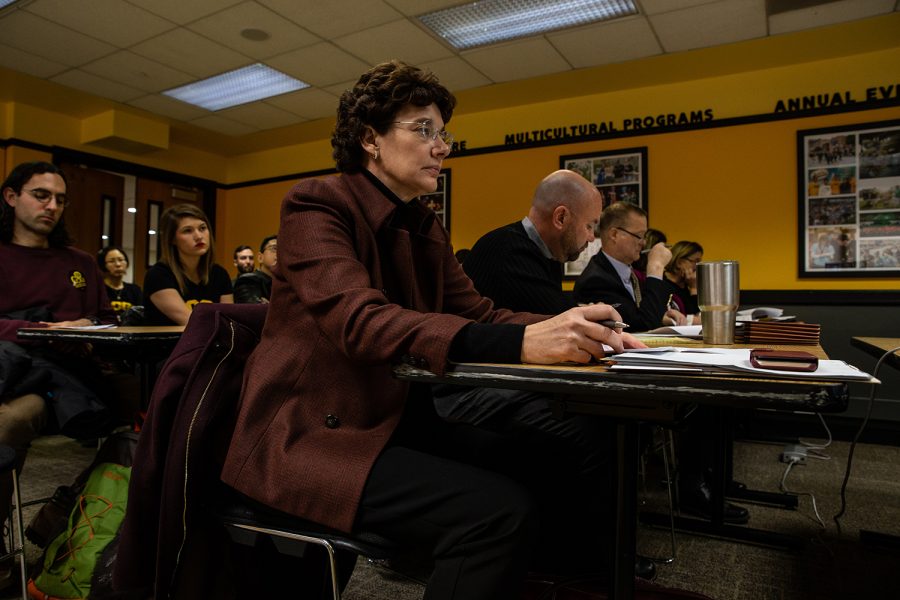COGS, Board of Regents kick off contract negotiations
COGS shared their initial contract proposal with the Board of Regents, asking for the restoration of bargaining language.
The Iowa Board of Regents Bargaining Committee hears proposals during the COGS policy proposal meeting on Wednesday, Nov. 28, 2018. The COGS policy proposal aims to solidify salaries, hours of work, benefits, and other terms and conditions for graduate students.
November 29, 2018
The Campaign to Organize Graduate Students kicked off negotiations for a new contract at a meeting with representatives of the state Board of Regents on Wednesday with an initial proposal that primarily focused upon a raise and a contract that restores all topics of bargaining.
The contract negotiations come after COGS’ recent recertification election, which followed a 2017 state law change that requires renewal of public-employee bargaining units such as COGS every two years. Under the law, not voting counts as a no vote, and bargaining units must receive 50 percent plus one yes votes to remain the bargaining unit.
“This proposal represents 22 years of graduate students’ voices,” COGS President Laura Szech said. “Our hope and expectation is that we will have the chance to negotiate successfully.”
Szech addressed the regents’ decision to review the original contract with COGS, which led to removing specific language from the document and limiting the topics the organization is allowed to bargain upon.
“We know that our teaching and leadership are vital,” Szech said. “Having language in contract and not just a policy protects our rights in the rare case we need to exercise them.”
COGS represents around 1,900 graduate students, more than 80 percent of whom voted for the organization to remain the bargaining unit for graduate-student employees in October.
1,559 graduate employees voted yes to recertify COGS, 11 graduate employees voted no, and there was one void ballot.
“We expect that the university will show that they value us,” Szech said.
The proposal for the 2019-20 contract between COGS and the regents included a series of requests and suggestions, including the restoration of union recognition, hours of work, appointments, and grievance procedure, among other items. COGS members seek a raise that would factor in the cost of living plus 3 percent.
RELATED: COGS to remain in existence, majority of members vote ‘yes’
COGS Campus Chief Steward Jaclyn Crumbley Carver emphasized the importance of a mutually beneficial agreement between the parties, referring to the COGS contract from 1996 and onward as evidence.
“The term agreement is essential to understanding what this document represents,” she said. “Calling a contract an agreement means the employer and employee have discussed and consented to.”
Other arguments in the proposed contract by COGS included the stress of unrealistic deadlines, fair wages, and paid versus unpaid leave, citing that graduate students should not have to choose between working and being with family.
The regents’ representatives present agreed to meet with COGS again in the future to further hash out details surrounding the proposed contract.
“Within two weeks, the Board of Regents will respond with its counterproposal, after which the formal negotiations begin where we find an agreement that is mutually satisfactory,” said Michael Goldberg, COGS’ bargaining and grievance member at-large.
Goldberg said much of the conversation regarding the restoration of the articles that were taken off the bargaining table was in response to the change in collective-bargaining laws, which now require both parties to mutually agree on topics for negotiation. If not, they are not up for negotiation.
Such was the case in the 2017-19 contract, which only contained one page, with an article pertaining to wages. Szech attributed this to the law change in 2017, when the regents chose to cut everything from the contract that they legally could, except for wages.
“We call on the university to respect the democratic decision made by the employees,” Szech said. “We propose that all legal contract language be restored so that our rights are also restored.”
Editor’s note: The DI originally reported that Szech said 1,924 graduate employees voted to recertify COGS. The article has been updated to reflect that 1,559 graduate employees voted yes to recertify COGS, 11 graduate employees voted no, and there was one void ballot.






